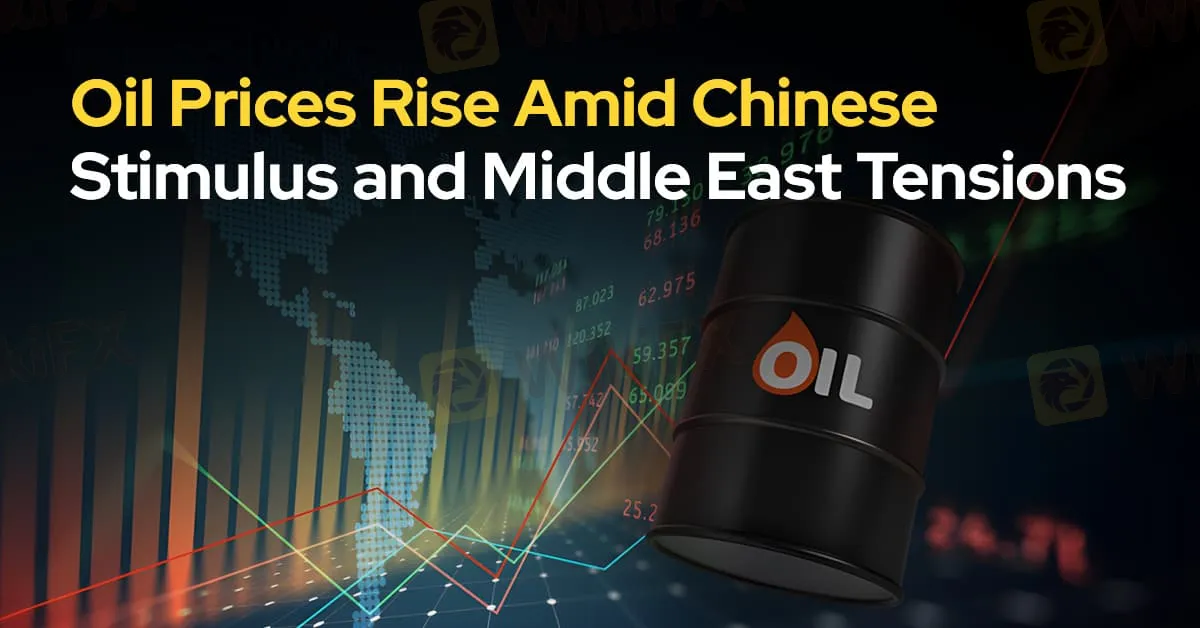简体中文
繁體中文
English
Pусский
日本語
ภาษาไทย
Tiếng Việt
Bahasa Indonesia
Español
हिन्दी
Filippiiniläinen
Français
Deutsch
Português
Türkçe
한국어
العربية
Oil Prices Rise Amid Chinese Stimulus and Middle East Tensions
Abstract:According to report, oil prices experienced a notable increase this week, with Brent crude climbing above $74 a barrel after a period of volatility.

Oil prices experienced a notable increase this week, with Brent crude climbing above $74 a barrel after a period of volatility. This rise follows a series of aggressive economic measures introduced by Chinese authorities, aimed at revitalizing the nations slowing economy. Meanwhile, escalating tensions in the Middle East, particularly involving Israel and Hezbollah, have contributed to the market's volatility.
After dipping by 0.8% on Monday, West Texas Intermediate was trading close to $71. The boost in prices can be attributed to recent announcements from Pan Gongsheng, the governor of the People's Bank of China, who outlined a comprehensive strategy to achieve the country's growth target of around 5% for the year. Key initiatives include enhanced lending capabilities for financial institutions and a reduction in the central bank's short-term interest rates, which are expected to stimulate both economic growth and energy demand in the worlds largest oil consumer.
According to Han Zhong Liang, an investment strategist at Standard Chartered Plc in Singapore, “These measures could positively impact China's demand for oil. The real challenge will be how effectively these lower rates translate into real economic activity.”
Conversely, the oil market is grappling with concerns about a faltering Chinese economy and the potential for increased supply from OPEC+, which has resulted in a 14% decline in prices over the past quarter.
In parallel, the geopolitical landscape has become increasingly tense as Israel launched a series of strikes against Hezbollah positions in southern Lebanon, leading to approximately 500 fatalities—marking the deadliest day of conflict since the 2006 war. Although Iran, a key ally of Hezbollah, has expressed a desire to de-escalate, the situation remains volatile.
As the market reacts to these dual pressures from economic policy and geopolitical tensions, the direction of oil prices will heavily depend on developments in China and the stability of the Middle East shortly.

Disclaimer:
The views in this article only represent the author's personal views, and do not constitute investment advice on this platform. This platform does not guarantee the accuracy, completeness and timeliness of the information in the article, and will not be liable for any loss caused by the use of or reliance on the information in the article.
Read more

Elites Gather in Taipei to Forge a New Forex Ecosystem
On April 19, the exclusive cocktail party hosted by WikiFX Elites Club concluded successfully in Taipei. The event brought together local forex industry leaders, seasoned experts, and elite practitioners to discuss industry trends and share cutting-edge insights. It fully demonstrated WikiFX’s irreplaceable value as a globally leading forex investment ecosystem platform in gathering industry wisdom and driving sector development.

False Promises, Real Losses: The Dark Reality of Online Trading Scams
In an era where financial independence is marketed as just a few clicks away, online trading platforms have become fertile ground for a dangerous breed of digital deception with seductive fake promises including quick profits, little effort, and exclusive insights.

Are We in a Retracement Or the Start of a Financial Collapse?
As markets fluctuation in uncertain times and headlines grow darker, investors are left asking a crucial question: Is this a temporary downturn or something far worse? The terms bear market, recession, and depression are often thrown around interchangeably, but they represent very different levels of economic pain. Read this article to understand the differences between all three.

No Recession in Forex? Is Forex Better Than the Stock Market?
As equity markets recently convulse under the pressure of rate uncertainty, geopolitical risk, and weakening macroeconomic signals, an age-old question resurfaces: when the stock market shakes, is it time to look elsewhere?
WikiFX Broker
Latest News
eXch Exchange to Shut Down on May 1 Following Laundering Allegations
FCA Proposes Simplifying Investment Cost Disclosure for Retail Investors
How a Viral TikTok Scam Cost a Retiree Over RM300,000
JT Capital Markets Review
Think Scams Won’t Happen to You? That’s Exactly What Scammers Count On
Beware of Gold Bar Investment Scams: Rising Threats
Finalto Teams Up with Alphaville for 2025 London Quiz
Kraken Launches Forex Perpetual Futures on Kraken Pro Platform
Elites Gather in Taipei to Forge a New Forex Ecosystem
SEC Warns of Love Scams and Pig Butchering Investment Schemes
Currency Calculator


